More than 1 million people use Jumpshare to share better
Hi there,
If you’re looking at Vidyard alternatives, you’re probably looking for something that offers a lot more features at a more reasonable price. Well, you’re on the right page. Further ahead, we’ve provided you with a comprehensive comparison of Jumpshare with Vidyard features to make the switch easier for you. Read ahead to know more.
| Features |  |
 |
|---|---|---|
| Capture Screenshot | ||
| Annotate screenshots | ||
| Annotate local images | ||
| Upload history | ||
| Record videos | Record GIFs | |
| Record audio | ||
| Record with click-tracking | ||
| Add call-to-action button on video | ||
| Embed video | ||
| Upload files | ||
| Upload folder | ||
| 200+ file type previews | ||
| Drag & drop upload | ||
| Compose notes | ||
| Advanced shareable links | ||
| Advanced link expiration | ||
| Schedule sharing | ||
| Bookmark websites | ||
| Favorites | ||
| Version history | ||
| Advanced analytics | ||
| Receive files from others |
There are some similarities between both Jumpshare and Vidyard. Similarly to Jumpshare, Vidyard allows users to create, share and host videos for remote communication. However, Jumpshare offers users more video sharing opportunities in much better quality and better video recording tools.
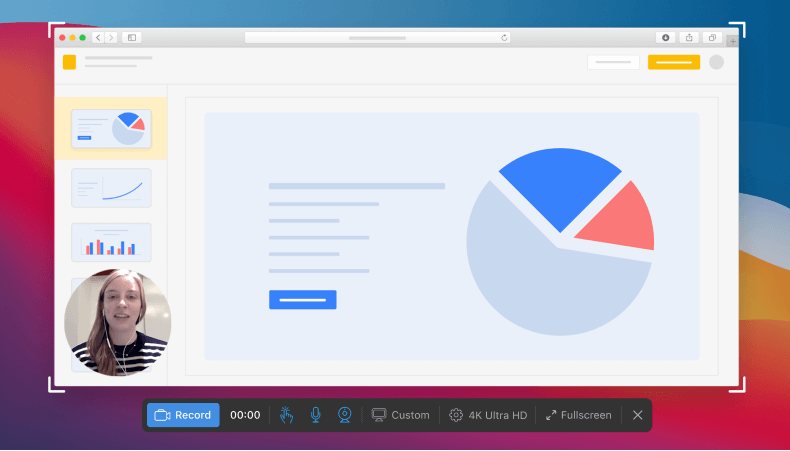
With Jumpshare you can record videos in 4K/UltraHD quality that will prevail no matter how many times the video is shared and viewed. Jumpshare also allows you to record with and without your webcam, offering users various webcam modes. Although Vidyard allows users to record with their webcam, it’s necessary for them to get the Google extension for it. Other than video quality, Jumpshare also offers more recording features like click-tracking and drawing on videos in order to make them more legible to your clients and team members, without making users download any extensions.
Furthermore, Vidyard allows users to add an in-video CTA (Call-to-Action) in their Teams and Business plan, same as Jumpshare - but Jumpshare also gives you a lot more features for a lot less. Jumpshare also lets you record and share GIFs, a feature that Vidyard does not provide.
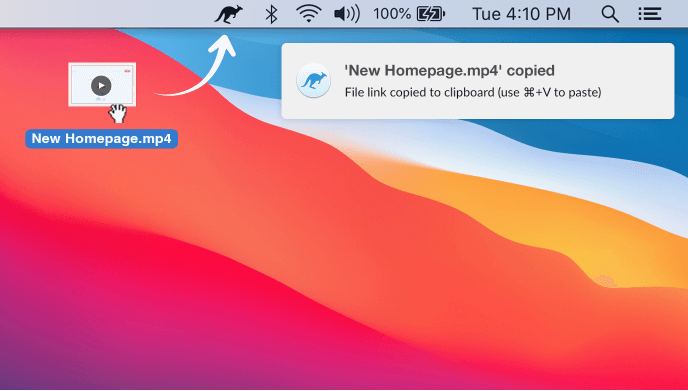
Other than the fact that Jumpshare gives users many more video recording tools, it’s also a lot faster at sharing because of its desktop app. Vidyard has a web app and mobile apps for android and iPhone. However, Jumpshare’s desktop app allows users to share faster without disrupting their workflow. It doesn’t require a browser in order to upload files, and uses key shortcuts that integrate with those on your system to make recording much faster. With Jumpshare, once you stop recording the video gets uploaded within seconds to your uploads and a shareable link gets copied to your clipboard automatically. The recording can then be shared via link or through email, along with a personalized note.
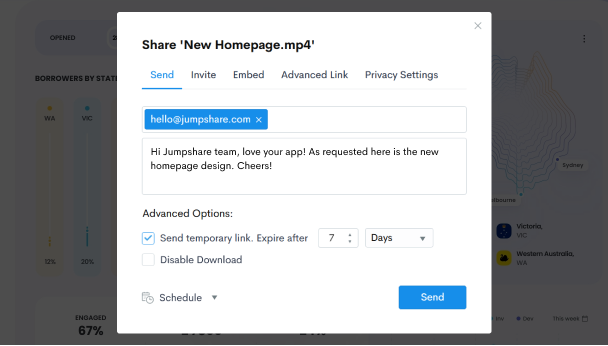
Vidyard and Jumpshare both allow users to embed videos to webpages, blogs or online documents, but with Vidyard embedding is limited. Vidyard limits embeds at 5, 20, 50 and 100 - the final being available to their Business plan. With Jumpshare, video embedding is unlimited.
Jumpshare allows users to switch seamlessly between their uploads and Team Library, promoting faster workflow and remote communication. Vidyard’s video sharing features rotate mostly around sales and marketing. This means that Vidyard focuses mainly on external communication as opposed to Jumpshare’s holistic sharing platform for teams. Both Jumpshare and Vidyard provide users with video analytics, and advanced link expiration, but Jumpshare offers users a wider array of options and more customizable access controls.
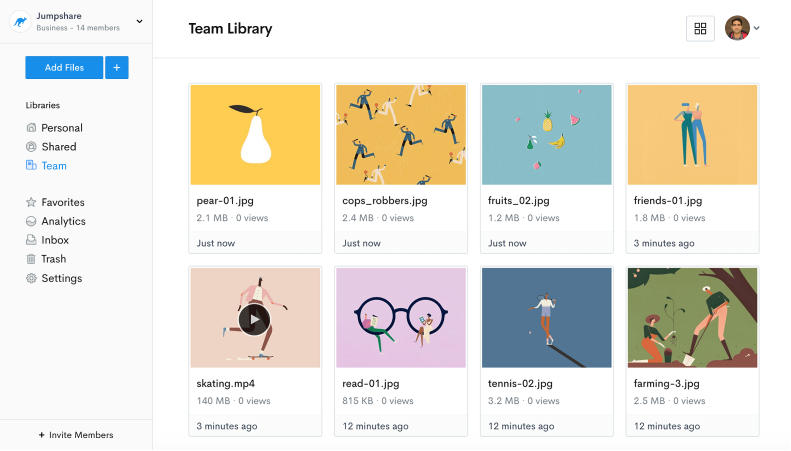
According to our calculations, Jumpshare users save up to 50 minutes every day simply by using Jumpshare for their work communication and remote sharing. That adds up to a whopping 16.6 hours saved every month. Time is always of the essence in work collaborations, so this is a big win for the productivity of remote teams. Jumpshare also provides businesses with a clean and customizable admin console and an internal notifications panel that ensures that all the team members are always on the same page.
Jumpshare provides you with a clean and adaptive interface, making sure that all its features are on display. The app’s experience and workings are seamless, allowing users to share videos and files back to back without causing any confusion or lack of clarity. Jumpshare creates a folder automatically if you upload a couple of files consecutively, ensuring a clearer digital workspace and a more organized inventory of shared files.
Vidyard’s interface revolves mostly around the sharing and creation of videos, and is all done on the web browser app. A panel on the left of the screen allows users to go through the main functions of the app, including changing themes, general actions and notifications. The interface is quite basic, with graphics that often create a lot of visual noise. Jumpshare’s clean dashboard and transparent organization makes it easy to use and also easy on the eyes.

Jumpshare also provides users with a better playback experience as opposed to Vidyard. The Jumpshare file viewer opens up in the browser, and provides features to share the file ahead or download it - depending on the uploader’s file permissions. Unlike Vidyard, the Jumpshare file viewer also allows guest users to leave time-stamped comments on videos without them needing to make a Jumpshare account.
Vidyard deals essentially with videos and video files. Jumpshare, on the other hand, offers users a lot more. Jumpshare offers users more features than just those revolving around videos and video recording. With Jumpshare, you can take pixel-perfect screenshots and annotate them before sharing them forward. You can also save and edit previous versions of an uploaded image file in order to make comparisons. You can record audio and voice notes, with Mono recording and with a choice of audio sources and playback speeds.
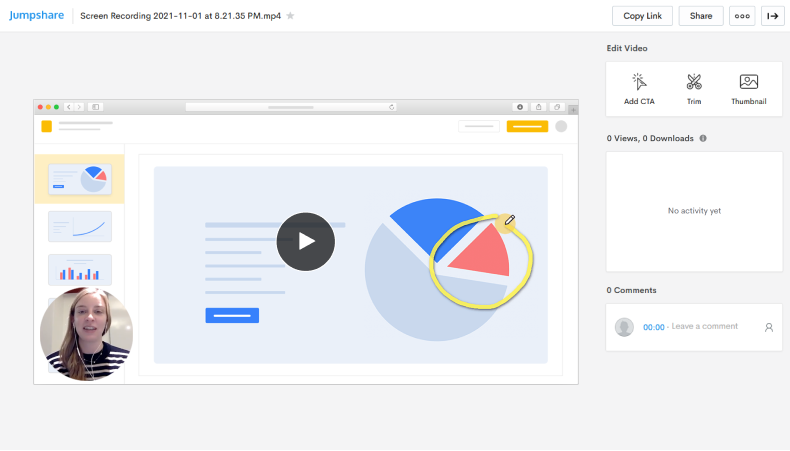
Jumpshare deals with more than just media - Jumpshare users can compose notes and share coding snippets, they can take timed screenshots, and upload local images, along with documents and other files. Furthermore, the Jumpshare file viewer can open and preview more than 200 file formats. This means that users can share almost any file through Jumpshare and their recipients will be able to view them, regardless of their format.
Vidyard offers users four plans: Free, Pro, Teams and Business. Billed annually, the Pro, Teams and Business plans are priced at $15/month, $300/month (3+ users), and $1250/month (5+ users) respectively. Video recording is limited to 1 hour for all the plans, both free or paid. The Business plan is limited to 100 video embeds. Additionally, Vidyard does not offer a trial for any of the paid plans, providing customers with demos and sales support instead.
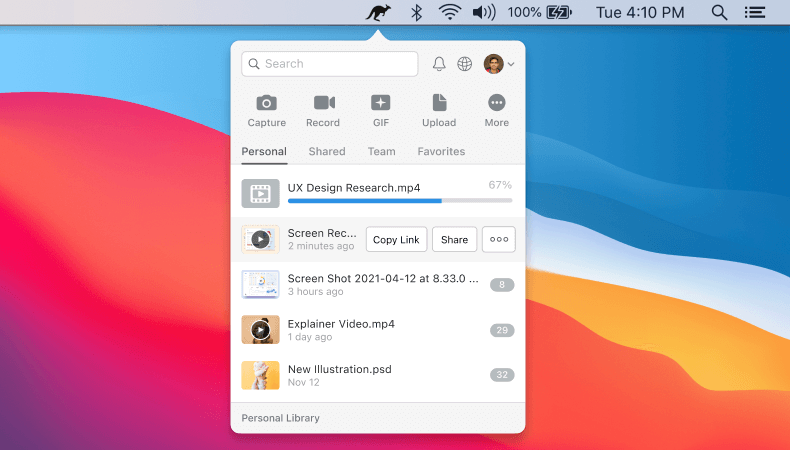
Jumpshare offers three main plans: Basic, Plus and Business. Basic is the free Jumpshare plan and the only one that limits video recording to 30 seconds. The Plus plan, costing $12/month when billed annually, is designed for professionals, and the Business plan, priced at $16/user/month when billed annually, is perfect for teams. If you do the math, that makes Jumpshare a lot cheaper than Vidyard for the number of additional features it offers.
If you really come down to it, Vidyard is mainly focused on video creation and sharing, based from a marketing and sales point of view. It offers users many basic video features, along with some other marketing and analytical strategies.
On the other hand, Jumpshare provides users with many more sharing options and advanced video features, along with audio recording and screen capture tools, and vastly intricate and seamless user experience. The best part? It costs a lot less than Vidyard, and offers a lot more. Jumpshare is a holistic communication platform for effective remote work and successful online collaborations.